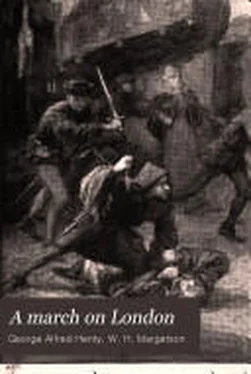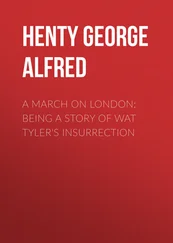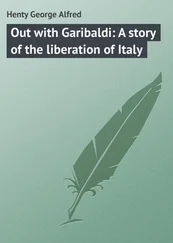“' Dear Sir Edgar,
“'It has given me very great pleasure to prepare this little surprise for you. I pray you, do not mar it in any way by returning me thanks. The gift is as naught in comparison with the service rendered. I am proceeding to the North to-morrow on business with Earl Percy, and shall not return for some weeks. When we meet next, I pray you, let there be no word of thanks concerning this affair, for I consider myself still greatly your debtor. You will find an agent of mine at your castle. He has been there some time, has made the acquaintance of all the vassals and others, and will introduce you to them as their lord. He has my instructions either to remain there to manage your affairs for six months, or for any less time you may choose. But methinks you will do well to keep him for that time, as he is a good man of business, and you will need such an one until you have mastered all the details, and can take matters entirely in your own hands.'
“So you see, father, we shall be free to start to-morrow. Sir Ralph, Lady De Courcy, and Mistress Aline will ride with us, and I trust that you will come also. We shall first go to Cliffe, which will be on our road, and, indeed, I believe that for some distance Albert's lands join mine. Then we shall go on to my castle—it sounds absurd, doesn't it, father?—and doubtless we shall be able to stay in Hoo, or if not, 'tis but two or three miles to Stroud, where we are sure to find good lodging.”
“I should like to ride with you, Edgar, but it is years since I have bestridden a horse.”
“We shall ride but slowly, father, for Dame De Courcy loves not for her palfrey to go beyond a walk. If you like you could bestride Hal Carter's horse, which is a strong and steady animal, and he can walk alongside, so as to be ready to catch the rein if it be needed. He will be very glad to go, for the honest fellow is in the highest delight at the news of my good fortune.”
“I think that I could do that, Edgar, yet I will not go by Cliffe, but straight to Hoo. I can then travel as I like, and shall not have to join in talk with Dame De Courcy nor the others, nor feel that my bad horsemanship makes me a jest.”
“Very well, father, perhaps that would be the pleasantest way for you.”
“If I get there before you, Edgar, I shall stop at a tavern in the main street of Hoo. There is sure to be one there; and will rest until you come along. If Hal Carter learns that you have passed through before my arrival, I will come straight on to the castle.”
Accordingly, early the next morning, Mr. Ormskirk started with Hal, and Edgar, after seeing them fairly on their way, rode over to the De Courcys'. All were in readiness for the start.
“Is not Mr. Ormskirk coming with us?” Dame De Courcy asked. “Recluse though he is, I thought he would surely tear himself from his books on such an occasion.”
“He has done so, dame, and is already on the road to Hoo, under the charge of Hal Carter. 'Tis so many years since he has bestridden a horse that he said that he should be ill at ease riding with such a party, and that he would therefore go on quietly, with Hal walking beside him, and would join us when we came to Hoo.”
They mounted at once. Dame De Courcy rode on a pillion behind Sir Ralph. Aline bestrode—for side-saddles had not yet come into use—her own pony. Two retainers followed, one leading a sumpter horse, with two panniers well filled with provisions and wine, together with some women's gear, in case the weather should turn bad, and a change be required at the halting- place for the night. They started briskly, and Edgar was glad that his father had gone on alone; the pace would have sorely discomposed him. Alternately walking and going at a canter they arrived in three hours at Cliffe.
“There is your castle, Albert!” Aline exclaimed. “It seems well-nigh, if not quite, finished, and is strongly posted on that hill, overlooking the whole country from Dartford to Sheerness. You will need a chatelaine before long, brother mine.”
Albert laughed, but coloured a little.
“Time enough to think of that, Aline.”
“Nay, I am in earnest. Many are betrothed, if not married, long before they attain your age.”
“I may say the same to you, Aline. 'Tis the fashion now for girls to be betrothed between twelve and fourteen. I have been wandering about and fighting and have had no time to think of love-making.”
Aline shrugged her shoulders. “You had better ask Sir Ralph and my mother for their views about me, Albert. It is not for a maid to make her own marriage, but a valiant knight like yourself can manage your own affairs, Methought perhaps that you would have to tell us that the Fleming's fair daughter was to assist you in the management of the castle that her father has given you.”
“Joanna Van Voorden!” Albert exclaimed, indignantly, while Edgar burst into laughter; “why, she is well-nigh as big as her mother already, and promises to be far bigger. Thank you, Aline; if the castle and estate had been offered me on the condition that I married her, I would have had none of them.”
“Well, sir, shall I make another guess?” Aline asked, mischievously.
“No, no, Aline,” Albert said, hastily. “No more guessing, if you please.”
They had by this time approached the castle. “Look, father!” Aline exclaimed, clapping her hands; “they must have been on the watch for us. See! they are raising a flag on that staff on the turret, and see, there are your arms blazoned on it.”
“'Tis a goodly castle for its size,” the knight said, as he drew rein and turned his horse so that his dame might get a better view of it. “There is a dry moat, which is lined with stonework. The walls are not very high, but they are well defended by those flanking towers, and the place could stand any sudden assault. I should say that it was about the same strength as our own. So far as I can see, the other arrangements are quite different. There is no keep, and it seems to me that the house is built rather for comfort than for defence; the windows are large, and it looks more like a Flemish house built within a castle wall than an English place of strength. Now let us ride on,” and they pressed their horses forward. The gates were thrown open when they approached within a hundred yards; the drawbridge over the moat had been already lowered.
“Ride you first, Albert,” Sir Ralph said; “you are lord of the place.”
As they came to the head of the drawbridge, a middle-aged man of grave aspect, dressed in the garb of a citizen, appeared at the gate, and six men-at-arms, in steel caps and body armour, armed with pike and sword, drew up behind him.
The man bowed deeply to Albert. “Welcome to Cliffe Castle, sir knight,” he said. “I am Nicholas Hocht, and have, by the orders of my master, Mynheer Van Voorden, been here for the last year to superintend the building of this castle, and in carrying out his other commands respecting it, with further orders to remain here, should you desire it, for the further space of six months as your steward. I received a message from him yesterday, saying that possibly you would be here to-day, and I must, therefore, have everything in readiness for you. The warning was somewhat short, but I have done my best, and I trust that you will pardon any shortcomings.”
“I am much beholden to you, Master Hocht,” Albert said. “You have done well, indeed, for a fairer castle and one better placed no one could desire.”
The men-at-arms saluted as he rode on. Entering the gate, they were able to see the house itself. It was, as Sir Ralph had said, rather a Flemish house than a knightly castle; the lower range of windows were small and heavily barred, but above there were large casements, pointed roofs, and projecting gables. It had an air of comfort and brightness. On the top of the broad steps leading to the great door were four retainers, all similarly attired in doublets of russet cloth and orange hose. As soon as the party alighted they ascended the steps, led by the steward. When they entered the great hall a general exclamation of surprise broke from them.
Читать дальше












